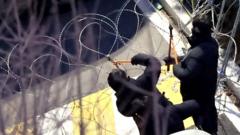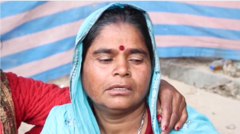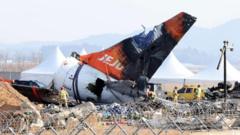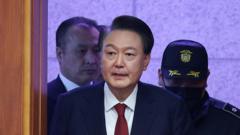Yoon Suk Yeol, South Korea's impeached president, has been arrested following a tense standoff with investigators. Accused of insurrection linked to a failed martial law order, Yoon’s dramatic arrest signals significant political upheaval as the nation grapples with stark divisions and uncertainty.
South Korea’s Political Crisis Deepens with Impeached President’s Arrest

South Korea’s Political Crisis Deepens with Impeached President’s Arrest
Former President Yoon Suk Yeol becomes the first sitting leader in South Korea to be taken into custody amid investigation for insurrection, escalating national turmoil.
In a stunning turn of events, Yoon Suk Yeol has made history as South Korea's first sitting president to be arrested, marking a significant moment in the nation's turbulent political landscape. Investigators and police, facing freezing temperatures, scaled walls and cut through barbed wire to take Yoon into custody at his residence in central Seoul.
The 64-year-old leader is under investigation for insurrection related to a controversial martial law order issued on December 3, which led to widespread unrest. Yoon's impeachment by parliament has suspended him from office, but his official removal will depend on the outcome of a ruling by the Constitutional Court.
The dramatic arrest on Wednesday followed weeks of escalating tensions between Yoon’s presidential security team and investigators from the Corruption Investigation Office for High-ranking Officials (CIO). After an unsuccessful attempt to detain him on January 3, authorities mobilized a much larger force on Wednesday morning, employing ladders and bolt cutters to breach barriers.
In a pre-arrest video statement, Yoon voiced his intention to cooperate with investigators, albeit under the assertion that the warrant for his arrest was not legally valid. His legal team has likewise claimed that the warrant was improperly issued, contesting the jurisdiction of the agency involved in the case.
The fallout from Yoon’s arrest has intensified political polarization in South Korea, with supporters and opponents expressing diverging reactions outside the CIO's office. The opposition Democratic Party, meanwhile, heralded Yoon's arrest as a promising step toward reinstating justice and democratic principles within the nation.
As Yoon faces the next critical stages of his investigation, the clock is ticking. Under current regulations, he can be held for up to 48 hours without a new warrant, which could allow further detention for an additional 20 days. Meanwhile, pro-Yoon demonstrators have rallied in response to his arrest, underscoring the emotional and political stakes in a country sharply divided by ideological lines.
The series of events that led to this historic situation centers on Yoon's attempt at imposing martial law, which was met with fierce opposition from lawmakers and the public alike. The recent tumult exemplifies the deep political fractures within South Korean society and raises critical questions about the future of governance in the wake of Yoon’s tumultuous presidency.
As the Constitutional Court prepares for a session that could determine Yoon's fate in politics, South Korea stands at a crossroads, grappling with the implications of a presidency plagued by scandal and division.





















